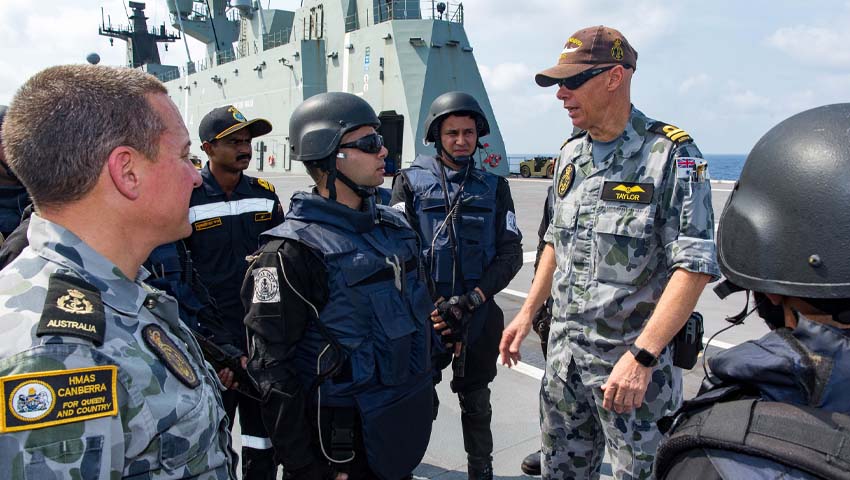On this day (15 August) in 1947, UK Parliament passed the Indian Independence Act, transferring legislative sovereignty to the Indian Constituent Assembly. It is only fitting that Defence Connect delves into the important relationship that Australia has with India on such an important day in their history.
To continue reading the rest of this article, please log in.
Create free account to get unlimited news articles and more!
Just days ago, Defence Minister Linda Reynolds spoke of Australia’s intention to ramp up engagement in the Indian Ocean and deepen the relationship Australia has with India.
Speaking at the WA Indo-Pacific Conference in Perth, Minister Reynolds signalled that the government intends to step up in the region it considers it has taken a backseat in.
“The Indian Ocean has not always received the same level of attention in our strategic thinking as the Pacific Ocean. Australia has tended to see itself as a Pacific Ocean state,” Minister Reynolds said.
“Like the Pacific, the Indian Ocean is increasingly characterised by rising strategic competition and intensifying great power rivalries.”
China, as usual, is in the thick of said “power rivalries”, with Beijing increasing the frequency of its naval fleets visiting the Indian Ocean.
This power struggle makes India an important ally to have for Australia, both for its investment in supporting a rules-based order, as well as its strategic placement.
It’s a relationship squarely at the front of the government’s thinking, with Minister Reynolds confirming that she hopes to “welcome my Indian counterpart to Australia to advance these discussions later this year”.
“Our Defence relationship with India has flourished over the last decade,” Minister Reynolds said.
“But there is scope to further increase the depth and complexity of our cooperation both on land, at sea and in the air.”
As well as the strategic benefits of a flourishing relationship with India, there’s also the economic value and industry potential to fully be realised between the two nations.
This goes double for the Indian Ocean, with over 40 per cent of our exports by value departing from Western Australia, and a third of Australia’s top 15 trade partners (India, Indonesia, Malaysia, Singapore and Thailand) all bordered by the Indian Ocean.
In 1996, Western Australia became the first state to open a trade and investment office in India. And last year, WA alone exported over $3 billion worth of merchandise to India.
Minister Reynolds confirmed that Australia would conduct more port visits, engagements and exercises in the Indian Ocean, after completing a “first” in the region earlier in 2019.
“The ADF has a long and proud history of supporting Indian Ocean security through both military and humanitarian activities,” the Defence Minister said.
“But we need to step up this engagement through an increased tempo of port visits, engagements and exercises.
“In 2019, our premier maritime activity, Indo-Pacific Endeavour, focused for the first time on the Indian Ocean.
“The search for Malaysian Airlines flight MH370 demonstrated how little we know about what goes on in the Indian Ocean.
“We cannot moderate behaviour in our region without being able to monitor and track what is occurring above and below its surface.”
It’s a strategy that is recognised across both major political parties, with shadow defence minister Richard Marles confirming that Labor agreed that Australia needed to step up its relationship with India.
“We must continue to invest in the Indian Ocean Naval Symposium, an initiative of India, which provides an important forum for the region’s navies to increase cooperation and understanding through dialogue. In turn, we need to grow our defence engagement with India,” Marles said at the WA Indo-Pacific Conference.
“Recently, Australia and India completed exercise AUSINDEX 2019, which is a biennial bilateral exercise between our two navies.
“This year’s AUSINDEX exercise was more complex than any of its previous iterations. While this is very encouraging, in time we need to see more visits from Indian Navy ships to Fleet Base West. And this ambition should extend to future exercises, visits and cooperation with the Indonesian navy. We should also look at what more we can do in cooperation with sub-regional groupings, including the Indian Ocean Commission.”
Marles also suggested that Pacific Patrol Boats could be deployed to the Indian Ocean.
“In August 1983, Labor Defence Minister – and a predecessor of mine as the Member for Corio – Gordon Scholes announced that Australia proposed to develop a Pacific Patrol Boat to meet the needs of regional states to protect their exclusive economic zones,” he said.
“Those boats have provided an invaluable capability that has been used for everything from fisheries surveillance to search and rescue, humanitarian assistance, medical evacuation and even the transportation of ballot boxes.
“Given the success of this program in the Pacific, perhaps we should consider whether there might be value in extending the program to island nations in the Indian Ocean region: nations such as Mauritius, the Comoros, Sri Lanka, the Seychelles, Madagascar and the Maldives. Not all of these countries may want it. But, for some, our patrol boat program could make a real difference.”

 Login
Login







